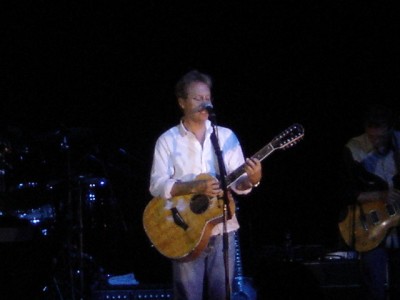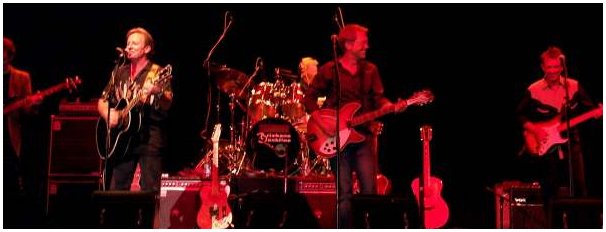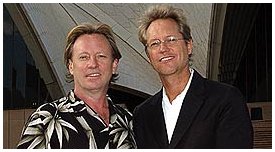|
The folk-rock trio America formed in Watford, England in 1968. Vocalists/guitarists Dewey Bunnell, Dan Peek, and Gerry Beckley met while they were still in high school. All three were sons of U.S. Air Force officers who were stationed in the U.K. After they completed school in 1970, they formed an acoustic folk-rock quartet called Daze in London, which was soon pared down to the trio of Bunnell, Peek, and Beckley.
Adopting the name America, the group landed a contract with Jeff Dexter, a promoter for the Roundhouse concert venue. Not long after, Dexter had America opening for Elton John and Cat Stevens and the group soon signed with Warner Brothers Records. By the fall of 1970, the group was recording their debut album in London, with producers Ian Samwell and Jeff Dexter. The first single release, "A Horse With No Name," immediately rose to the top of the charts. Once their debut album had become a huge success, America returned to the studio to record the follow up album. In the studio, they were assisted by session musicians on bass and drums. "Homecoming" soon became another massive success for the group, America.
During their concerts in Europe and America, it became clear that they needed drums and bass for their concerts. The group started to look for just the right musicians. They met David Dickey, and soon he became the bass player for the band. During the recording of their third album, Hat Trick, Hal Blaine, who already had played on the Homecoming sessions, joined the band. Unfortunately, due to his work as a session musician, he could not join the band full time.
After the release of Hat Trick, America was introduced to George Martin, the former producer of the Beatles, in 1974. He had always really liked America's music and already had a few ideas to enrich the sound of the group. Martin produced the next album in England. During this same period of time, the band met Willie Leacox, a drummer who really fit into the direction that they were moving toward, musically. Now America was able to play all of the instruments they needed while on the road - they could now reproduce their studio sound in a "live" setting.
With Martin, they became superstars. Although he gave the group all the freedom it needed to express their artistic tallent, he also used his vast studio expertise to fine-tuned the final arrangements. The first result of their collaboration was the album, Holiday, and the album became America's biggest success to date. Their next joint album, Hearts, repeated this success, and the single "Sister Golden Hair" climbed to the top of the charts all over the world.
When the record company decided to release History Of America (a "Best Of..." album) in 1975, Martin remixed some of their older recordings to make them sound "fresher." For the next several years, America was very busy performing live or recording new material - the group seemed to be everywhere!
In 1975, Dickey could not go to Europe with the band, so he was temporarily replaced by Calvin Samuels who had played with Crosby, Stills, Nash & Young in the early seventies. During their tour of Europe, America also found the time to perform on the German TV show, Musikladen. This concert was eventually released on a special video and audio CD in 1995. The concert was also released on DVD several years later in 2001.
In 1976, Beckley, Bunnell and Peek added Jim Calire (keyboards and saxophone) and Tom Walsh (percussion) to the line-up. In 1977, Peek left the group to start a solo career while America continued on as a six-piece unit. During another tour in 1977, their first without Peek, they recorded an album which was later released as America Live.
At the beginning of 1978, Mike Woods joined the band to add an additional guitarist to the mix. The first release featuring the guitar work of Woods was a recording of the old Mamas and Papas song, "California Dreaming." This track was recorded for the soundtrack to the film of the same name.
In 1979, Live in Central Park became the last album that America had to record for Warner Brothers. This left Bunnell and Beckley free to start looking for a new recording contract. After signing with Capitol Records in 1979, they went into a recording studio to record their first album for the new label, Silent Letter.
In 1980, Calire and Walsh left the group and America continued, now as a quintet. The band's association with Martin also ended in 1980 as Bunnell and Beckley wanted to explore new ways of producing their sound and music. They did not bring their backing band into the studio, but, instead, selected well known musicians to accompany them. Percussionist Willie Leacox was the only actual group member to continue to record with the band. Matthew McCauley and Fred Mollin were the new producers for these sessions. The resulting album, Alibi had the typical sound of America but without Martin's trademark "orchestra sounds." These recording experiences led to the idea to transfer this fresh new fresh sound to their concerts. Leacox and Woods stayed in the new line-up, but Dickey, who wanted to record his own compositions, left the band and joined a band known as Blue Steel. For the following tour, Bryan Garofalo joined the group, but, due to his studio commitments, could not join America permanently.
In 1981, Brad Palmer, who had worked with Andrew Gold and Wendy Waldman in the past, joined the group as their new bass player. For the next recordings, all members of America went into the recording studio along with many session musicians. This same process was repeated for all of the other studio sessions the band did during the remainder of the eighties. If one listens to the live recordings which were recorded during the eighties (King Biscuit Flower Hour Presents America In Concert in 1982 and America In Concert in 1985), it is difficult to understand the reasons for this decision, as the live recordings in most cases sounded far better than the studio sessions.
Although they still performed a few concerts now and then after 1985, America seemed to have retired from recording until 1993 when Rhino Records asked the band to record several new songs for a "Best Of..." compilation that they were planning. Encore featured some of these new recordings. The five musicians really enjoyed their new experiences in the studio so well that they decided to become active again. In 1994, they released their first new album in almost ten years - Hourglass. The next album, Human Nature, was released in 1998. In 2000, Rhino released a 3-CD retrospective covering the band's entire career. This compilation even included some unreleased demo recordings. In 2001 another "Best of..." album was released and, once again, included a few new recordings.
In 2002, America returned to its well known creativity. During the summer concert period, they recorded a live album, which was released as the Grand Cayman Concert. At almost the same time, they recorded a Christmas album, Holiday Harmony, together with Andrew Gold.
Gold not only produced the album but also played all of the instruments.
Palmer had left the group at the end of 2002, and America had to look for another bass player. Dewey and Gerry did not want to rush things up, so they asked a few friends to temporarily sit in with them. When America returned to the stage in January of 2003, bass player, Trent Stroh had joined the band. Stroh remained with the group during January and February of 2003.
By April of 2003, the group had found their new bass player. In an interview with John Beaudin of Smooth Jazz Canada, Beckley made some remarks concerning the bass players who had recently played with America: "We have had an interesting few months, because we have had a couple of good friends filling in during our touring schedule. Both Chas (Frichtell) and Trent (Stroh), who have been filling in, have just been fantastic. Any time there is new blood it adds a little energy. We then went through the audition process and picked a guy named Richard Campbell. He is no secret to L.A. players as he was with Natalie Cole for years and also with Three Dog Night."
America has had a very busy 2004 so far. They’ve taken their show to Hawaii, Sydney, Melbourne, Auckland, Paris, Rome, and Milan, to name a few! They had two sold out shows at the Sydney Opera House which they’ve also recorded for a new live DVD. They are looking forward to a very busy summer concert schedule.
|























































































